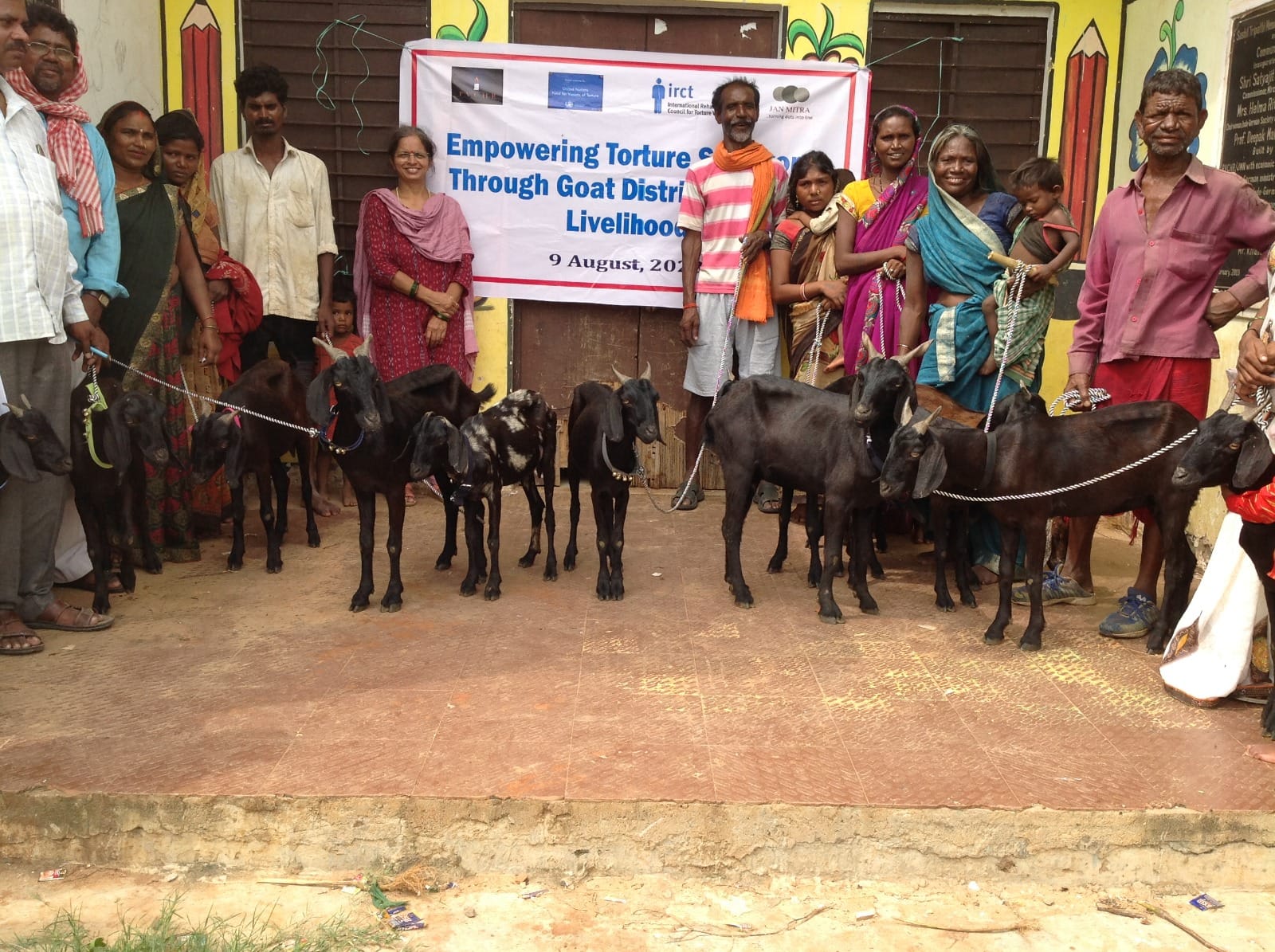In a remarkable collaboration with the People’s Vigilance Committee on Human Rights (PVCHR), “Janmitra Nyas” has embarked on a pioneering endeavor with a profound goal — to restore autonomy and dignity to survivors of torture. This noble initiative, fortified by the unwavering support of the International Rehabilitation Council for Torture Victims (IRCT) and the UN United Nations Trust Fund for Victims of Torture, is focused on providing a unique pathway to economic self-reliance. At the heart of this transformative effort is the provision of goats for goat farming to survivors, symbolizing empowerment, renewal, and the reclamation of their lives.
This visionary program stands as a testament to Janmitra Nyas’ commitment to uplift impoverished and marginalized communities. The initiative extends a lifeline to 20 families, granting them goats for goat farming. Beyond mere livestock, these animals become agents of change, equipping families to not only secure their present but also forge a promising future.
Nestled within the precincts of Varanasi district, particularly in the Badagaon block and the villages of Deenapur & Bajardiha slum area, along with the Raup village in Sonbhadra district, compassion echoes through tangible action. Families that have endured the harrowing grasp of police torture or have borne the weight of losing loved ones due to custodial deaths find solace and empowerment. Widowed women, survivors of custodial deaths, including 12 torture victims and 3 individuals who tragically met their fate in the confines of Raup Ghasiya Basti in Sonbhadra district, are embraced in this endeavor. The goats they receive symbolize resilience, transformation, and the promise of a fresh start.
In tandem with IRCT, PVCHR embarks on a holistic mission that surpasses the realm of mere assistance. Introducing innovative approaches such as kitchen gardening and goat rearing, they delve into the depths of healing and rehabilitation. Mindful of the challenges survivors face while rebuilding their lives, this collective endeavor strives to mend the economic foundations and restore the dignity stripped away by trauma.
The scars of torture, be they physical or psychological, bear witness to the depth of survivors’ suffering. This pain often weaves a cycle of despair that hampers their engagement with conventional employment avenues. Thus, the innovative practices of kitchen gardening and goat rearing are not just practical solutions; they offer a profound journey towards psychological renewal.
The act of nurturing a kitchen garden not only provides sustenance but also empowers survivors with control over their nourishment. This pursuit becomes therapeutic, allowing them to connect with the earth in a manner that mirrors their own rejuvenation and growth, in contrast to the pain they’ve endured.
Similarly, the venture of goat rearing transcends the realm of economics. Nurturing these animals imparts valuable skills and, more significantly, instills a renewed sense of responsibility and purpose. For survivors who’ve wrestled with diminished self-esteem and confidence due to their experiences, this initiative serves as a catalyst for the restoration of their self-worth.
The fruits of these livelihood initiatives carry a multi-faceted significance. Beyond uplifting survivors and their families, they contribute to the broader cause of justice. This sustainable cycle not only empowers survivors but also propels the pursuit of justice on their behalf, creating a virtuous circle of healing, recovery, and advocacy. Through these forward-looking efforts, PVCHR and IRCT light the path to reclaiming lives, nurturing resilience, and fostering strength and hope.
During this pivotal juncture, Shruti Nagvanshi, a Managing Trustee of the organization, underscores the imperative of empowering torture survivors to lead lives of dignity. She stresses that their integration into society necessitates dedicated efforts and specialized programs rooted in human development indicators. Shirin Shabana Khan, a senior member of the management team, highlights the organization’s ongoing commitment to empower survivors through local school initiatives, enhancing knowledge and behavioral practices for sustainable development. This approach aims to provide marginalized victim communities with relief from economic crises and a path to sustained progress. Distinguished members of the organization, including Mangla Prasad, Chhaya Kumari, Rajendra Prasad, Jyoti Kumari, Sanjay Kumar, and Pintu Gupta, actively partake in this significant event, embodying the essence of collective transformation.
(The picture has been used by the author for demonstrative purposes only)
